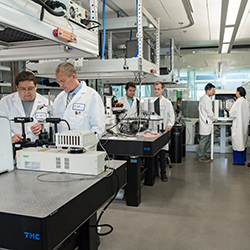UA Receives National Science Foundation Grant
The University of Arizona College of Medicine – Phoenix’s Center for Applied Nanobioscience and Medicine has received a grant from the National Science Foundation (NSF) to plan an Industry-University Cooperative Research Center (IUCRC).

“There is potential benefit in looking at the logistics for supply chain management in health care,” Dr. Zenhausern said. “We have this science fiction view of what the future of smart health care could be and we want Phoenix to become a leader in developing these platforms.”
The University of Arizona will work with Arizona State University, University of Southern California, University of Connecticut and Southern Illinois University to form a Cooperative Research Center.
“This is a competitive and prestigious grant to receive,” Dr. Zenhausern said. “It’s something that will have a huge impact for our medical school and it demonstrates that we are recognized as a translational research entity that can produce and deliver.”
The IUCRC works in two phases. The lab and each of its academic partners received $15,000 for the first phase where they are expected to put together a team and engage with potential industry partners. In the second phase, each academic entity needs commitment of a minimum of 10 industry partners. They each will receive an additional $150,000 per year from the NSF, which will be matched by each industry partner.
“This grant shows that Phoenix can be very competitive,” Dr. Zenhausern said. “We are getting grants and conducting research with all agencies including the NSF, National Institutes of Health and the Department of Defense.”

The objective of UA’s project is to hold workshops with industry partners and NESTT partner universities. The workshops will outline a research agenda and identify industry support for an Research Center focused on providing IoT solutions specific to designing industry specifications and prototyping health logistics appliances, wearable sensor systems, ambient intelligence and artificial intelligence data algorithms that be integrated effectively into the regulatory framework and processes of the health care delivery system.
The UA NESTT site will investigate this digital transformation through the entire value chain, from discovery to bedside. Health platforms designed to address unmet needs and improve medical access to underserved large populations will provide useful solutions to the global health care challenges, Dr. Zenhausern said.
The agenda and documentation of activities for the NESTT IUCRC planning meetings will be made available on UA’s website for the Center for Applied Nanobioscience and Medicine. It will be maintained until the establishment of NESTT, and then merged with the NESTT site.
About the College
Founded in 2007, the University of Arizona College of Medicine – Phoenix inspires and trains exemplary physicians, scientists and leaders to advance its core missions in education, research, clinical care and service to communities across Arizona. The college’s strength lies in our collaborations and partnerships with clinical affiliates, community organizations and industry sponsors. With our primary affiliate, Banner Health, we are recognized as the premier academic medical center in Phoenix. As an anchor institution of the Phoenix Bioscience Core, the college is home to signature research programs in neurosciences, cardiopulmonary diseases, immunology, informatics and metabolism. These focus areas uniquely position us to drive biomedical research and bolster economic development in the region.
As an urban institution with strong roots in rural and tribal health, the college has graduated more than 1,000 physicians and matriculates 130 students each year. Greater than 60% of matriculating students are from Arizona and many continue training at our GME sponsored residency programs, ultimately pursuing local academic and community-based opportunities. While our traditional four-year program continues to thrive, we will launch our recently approved accelerated three-year medical student curriculum with exclusive focus on primary care. This program is designed to further enhance workforce retention needs across Arizona.
The college has embarked on our strategic plan for 2025 to 2030. Learn more.